





For a century, our university has been a beacon of knowledge and innovation, shaping the minds of the many students who have walked its campus. The smiling faces of students, past and present, reflect the joy of discovery and the pleasure inherent in the pursuit of excellence. Over the years, our institution has evolved, examining advancements and embracing change to foster new knowledge, while remaining committed to the foundational values of a liberal arts education. This rich history is marked by groundbreaking research, transformative educational practices, and a commitment to nurturing the intellectual and personal growth of every student. As we celebrate 100 years, we have honored the legacy of those who have contributed to our vibrant academic community and looked forward to the future with optimism and pride.
The true distinction of excellence within our liberal arts university lies in the vigorous and diverse learning communities we cultivate. These communities are composed of individuals who bring a wealth of perspectives, experiences, and passions to the academic environment. In the following pages, you will glimpse the results of the collective curiosity, creativity, and commitment of students, faculty, and staff that foster an atmosphere of intellectual rigor and personal growth. In our halls and classrooms, the exchange of ideas is not just encouraged but celebrated, leading to a dynamic and enriching educational experience. The unique contributions of each member of the Douglas S. Witcher School of Humanities and Behavioral Sciences create a tapestry of knowledge and understanding that is unparalleled in its impact and exceptionally student-centric in its nature.
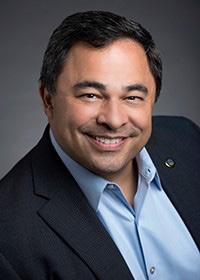
Thank you for taking the time to examine some of the evidence that our school is a beacon of academic and personal excellence, as reflected in these highlights of recent scholarly accomplishments.
Dean Ken Elston, MFA
Fall 2024 Newsletter
DEAN
Ken Elston, MFA
ASSOCIATE DEAN
Dr. Stacy Lipowski
DEPARTMENT CHAIRS
Criminal Justice
Dr. Alec Szalewski, Interim
English
Dr. Bryan Vescio
History
Dr. Joey Fink
Political Science
Dr. Martin Kifer
Psychology
Dr. Kirsten Li-Barber
Religion & Philosophy
Dr. Chris Franks
Sociology & Anthropology
Dr. Matthew Sayre
World Languages, Literatures, & Cultures
Dr. Daliang Wang
OFFICE OF THE DEAN
1171 College Village
High Point University
One University Parkway
High Point, NC 27268
Newsletter Questions or Comments?
Send to: Tiffany Medford, HBS Admin Asst. tmedford@highpoint.edu

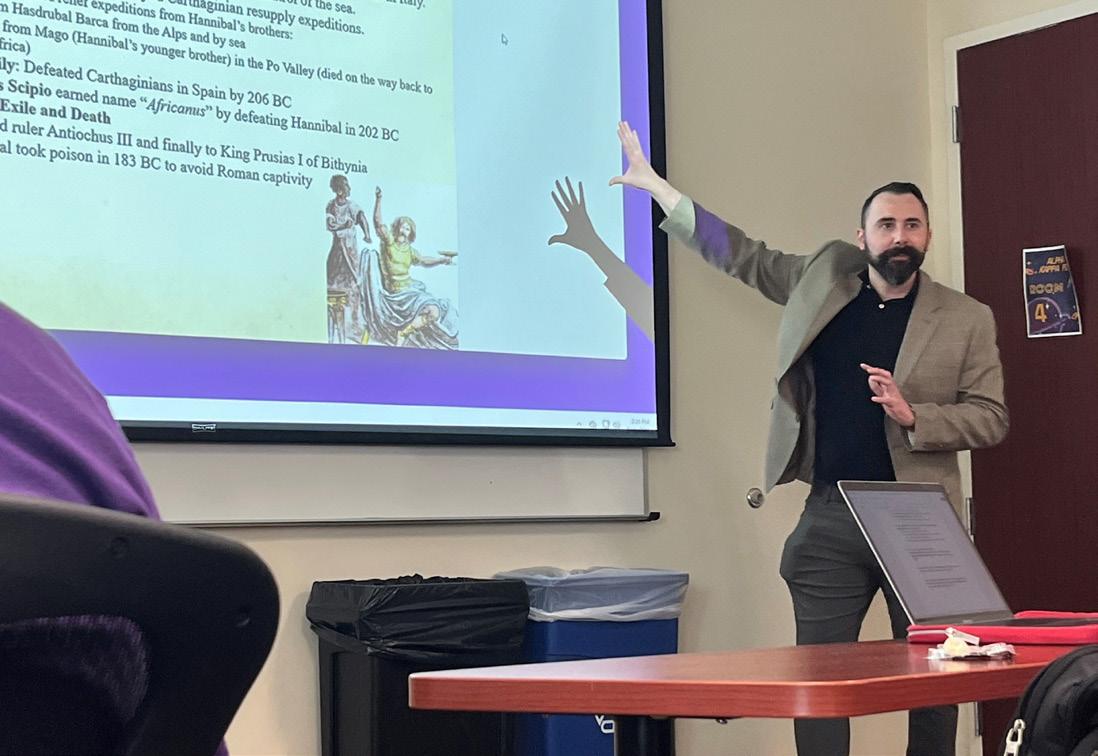

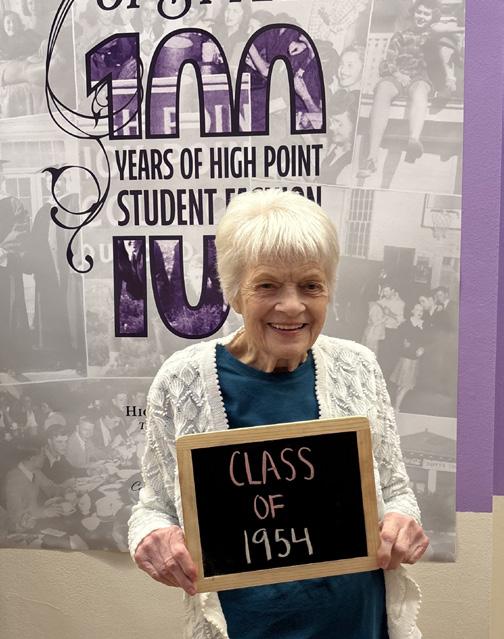
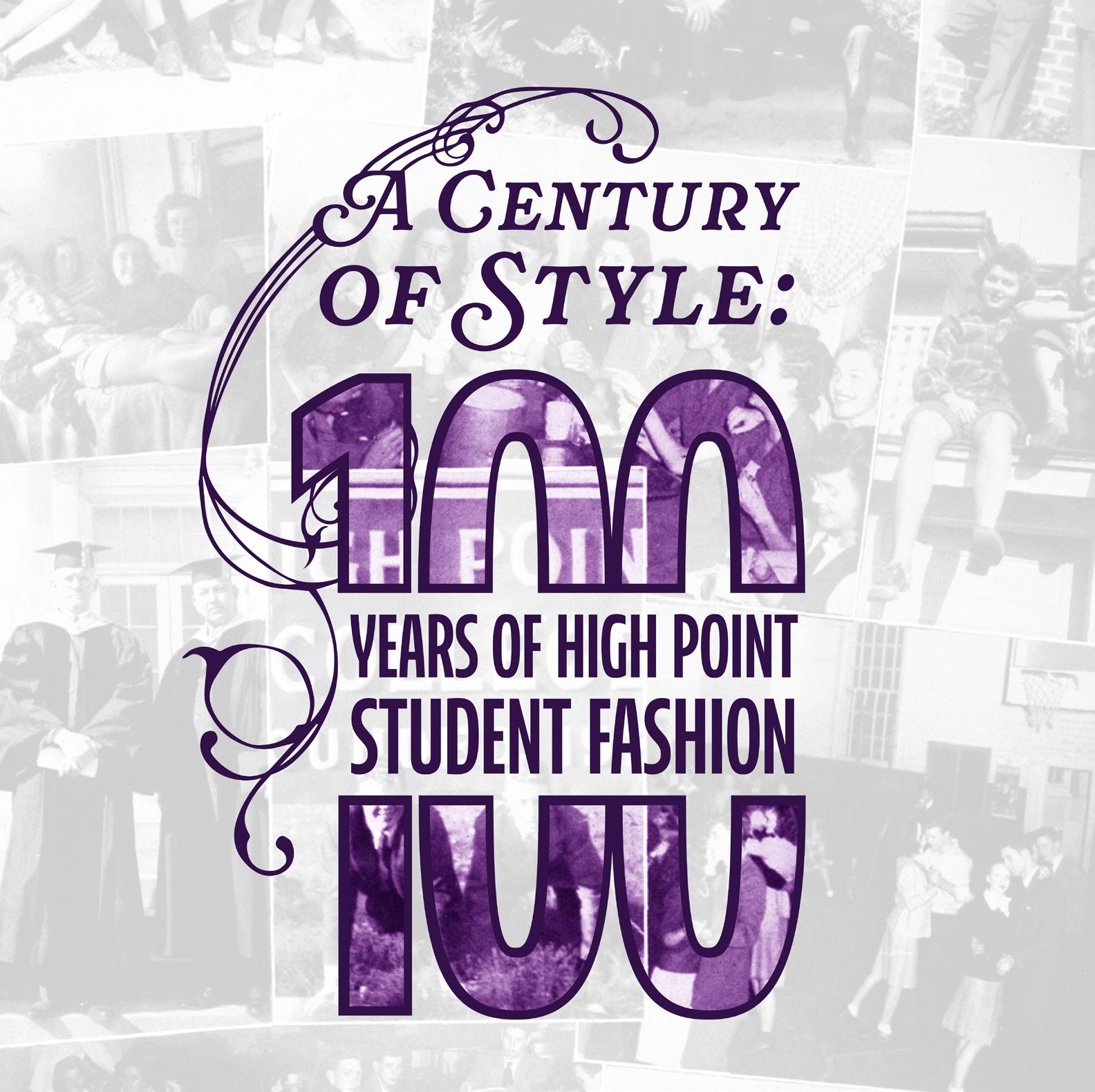
For two years, Dr. Joey Fink, chair of the History Department, and her students conducted extensive archival research and collected oral histories in preparation for HPU’s centennial celebration.
The culmination of their efforts, an exhibit titled A Century of Style: 100 Years of High Point Student Fashion, was displayed in the Sechrest Gallery from October 27 through November 15. This unique, student-centered exhibit was co-curated with Dr. Emily Gerhold, assistant professor of visual arts and director of the Sechrest Gallery. Together, Drs. Fink and Gerhold showcased the evolution of student fashion and self-expression across a century, reflecting the rich cultural and social history of the university through the lens of style.
2 Douglas S. Witcher School of Humanities and Behavioral Sciences

Fashion was a natural choice as the central theme for the celebratory exhibit. Chosen for its ability to resonate with everyone, fashion and style reflect personal identity, cultural heritage, and a sense of belonging in each decade of HPC/HPU’s history. Whether in the “Roaring Twenties” or in the grunge era of the 1990s, each decades’ fashions tell a story about this school and the students who called it home. By centering the exhibit on student fashion, the past and present were bridged together to reveal how personal style has evolved in tandem with cultural shifts.
Using the plethora of visual resources from the university’s archive, particularly digitized Zenith yearbooks, students were able to curate a gallery of images that embodied each decade. Along with interpretive text written by Dr. Fink, the photographs created a timeline that illustrates the shifts in style and identity over HPU’s 100 years.
For Dr. Fink, one of the most meaningful aspects of the exhibit is the shift that took place in the early 1970s. “This era marks a dramatic change in student self-expression,” says Dr. Fink, “as dress codes relaxed and students embraced new freedoms. The clothing choices of the time reflected broader cultural and political changes in American society, capturing the spirit of a generation that questioned societal expectations and redefined what it meant to be young. It wasn’t just about what students wore; it was about what their choices represented: the freedom to express themselves authentically.”
Curating this exhibit presented unique challenges, particularly when it came to finding the right artifacts to bring the student experience to life. While significant historical documents and objects associated with famous people are often preserved, the everyday items that students used and cherished tend to get lost over time. These “common” objects—whether it’s a favorite lip gloss from
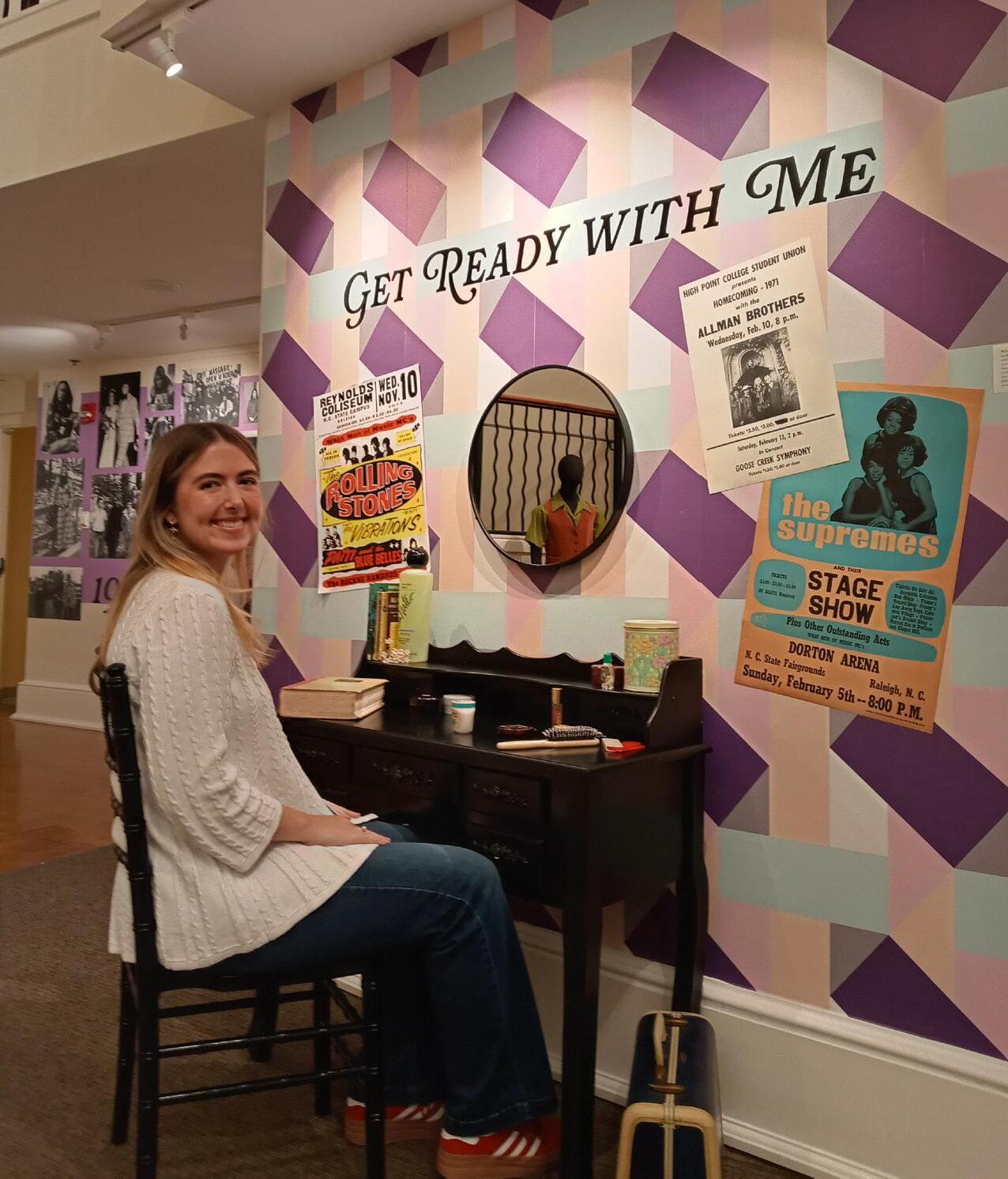
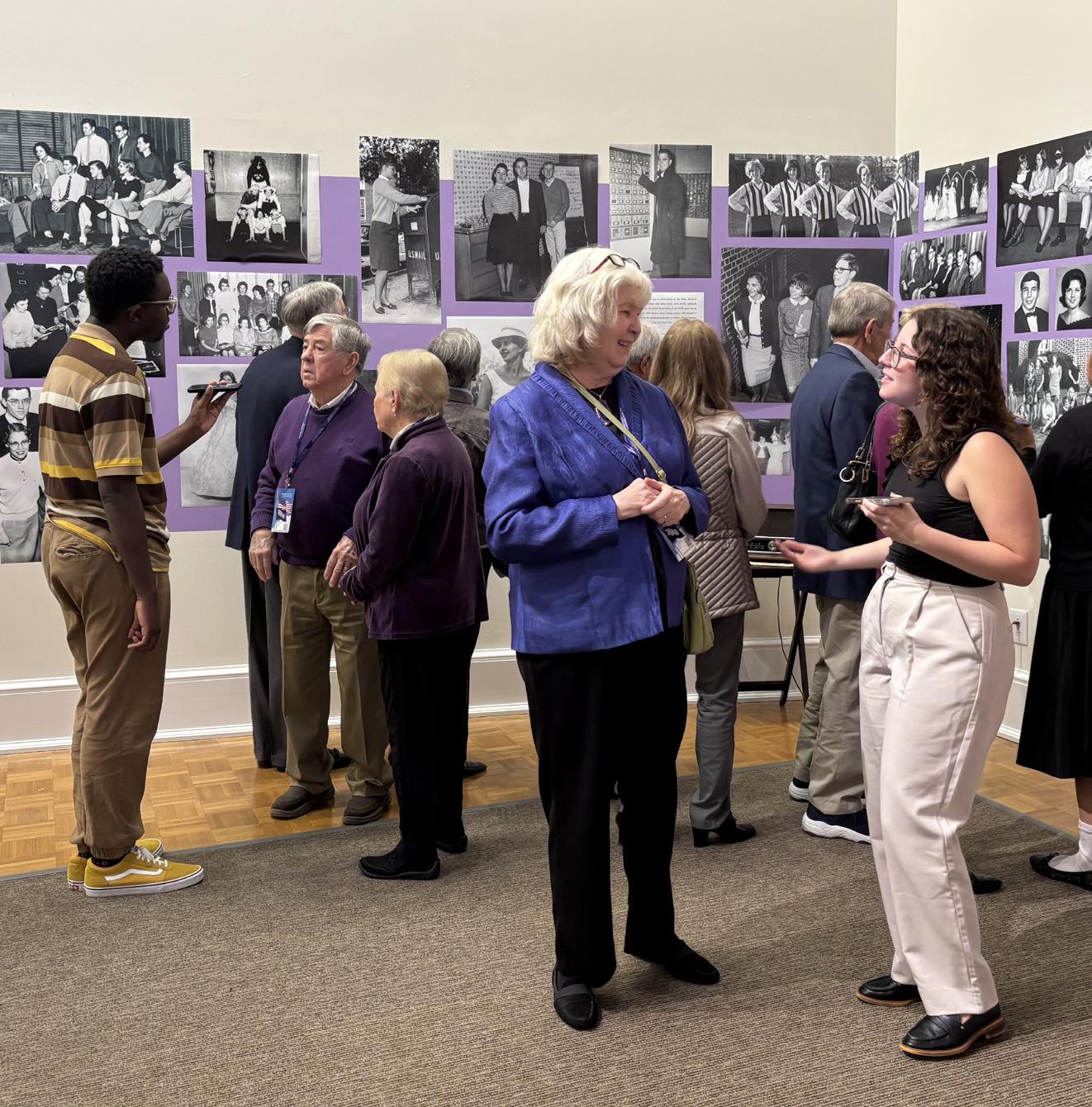
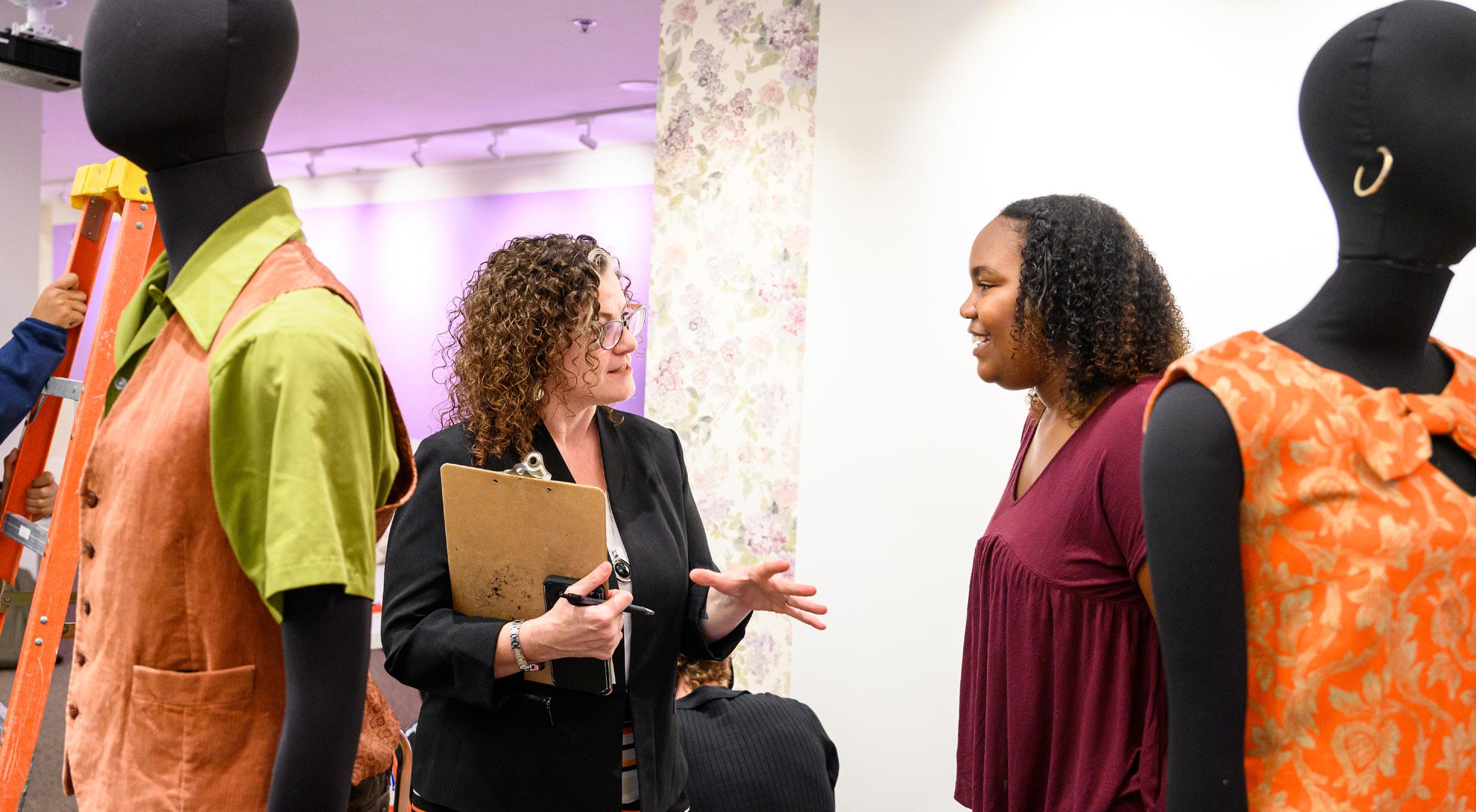
1968 or a concert pin that adorned a denim jacket in 1982—are seldom considered valuable enough for preservation, yet they are vital to understanding the lived experiences of students across different eras. By sourcing items from local thrift stores and incorporating personal artifacts passed down from grandparents, faculty and students overcame this challenge, crafting a cohesive narrative throughout the decades.
Similarly, oral history interviews posed challenges in uncovering the mundane quotidian aspects of student life. Alumni were often uncertain about the value of their memories, questioning why anyone would be interested in their daily routines or what they wore to class. Students had to convince interviewees that their “ordinary” experiences were precisely what was needed for this exhibit. However, once those memories began to surface, the stories were rich and vibrant. Alumni reminisced about standing in line at the cafeteria, Homecoming attire, or attending class in shirts and ties.
History major Alexis Way worked with alumni to collect oral histories. “Working with Dr. Fink, on this project,” said Way, “has taught me the
active, boots-on-the-ground work that comes with being a historian through conducting oral history interviews. Most interviewees are surprised that we’re interested in hearing about their time at HPU but by the end of their interview, they are teary-eyed and in awe about how impactful their college years were. It is an honor to be a facilitator for them to share their stories and use their experiences to help inform our work on the exhibit. These oral histories show that it’s not just our college years that influence our lives but how we shape the story of our college.”
Designed to inspire reflection on HPU’s 100 year history, the exhibit fostered belonging among past and present students. Beginning with early photos of the university’s first students in 1924 and culminating in a digital display of today’s students, HPU’s century-long story is rich with enduring tradition. Through the exploration of how past generations expressed themselves through fashion, current students were able to connect with a legacy of self-discovery and personal growth.
HBS leads way in rethinking assessment models for faculty.
In May, Dean Ken Elston, Associate Dean Dr. Stacy Lipowski, and Dr. Timothy O’Keefe presented at the American Association of Colleges & Universities (AAC&U) national conference. Presenting their poster, Using Shared Core Values to Inform Pedagogy, Course Policies, and Assessment of Teaching, they represented HBS and showcased the collective efforts of its faculty to reimagine teacher evaluations and classroom assessments.
The need to rethink assessment tools arose after an institutional restructuring that divided the David R. Hayworth School of Arts & Sciences between three separate schools, out of which the Douglas S. Witcher School of Humanities and Behavioral Sciences was born. Coming together as a new school, HBS faculty recognized the need for a clear mission statement, the desire to build community with one another, and the concern about validity and accuracy of
teaching assessments and course evaluations.
To foster a stronger sense of community and develop a unified mission statement, HBS faculty identified shared core values as an organizational framework. First, faculty were encouraged to reflect on their own values within classroom assessments and then expand those values to align with the broader goals of the school’s learning communities. Shared core values such as growth, resilience, curiosity, and integrity became foundational in shaping the school’s direction and identity.
Building on this values-based framework, faculty then formed peer teaching groups to develop assessment methods aimed at effectively evaluating teaching practices. These methods were subsequently implemented throughout the school and across a significant portion of general education core classes. The result cultivated a community-wide ethos within HBS centered on a passion for learning, personal growth, and the pursuit of a well-lived life.

Dr. Laura Alexander, Associate Professor of English
Dr. Alexander received the 2024 Ruth Ridenhour Scholarly and Professional Achievement Award for her outstanding contributions to her discipline. Specializing in 18th-century British literature, her research actively informs the curriculum of the English department, particularly her courses on British literature, fairy tales, and women writers. She has published four single-authored books, two edited volumes, and 37 peer-reviewed articles and book chapters. She is also a mentor to students, who cite her encouragement and guidance as instrumental to their academic and professional achievements. In November, she delivered the Ruth Ridenhour Scholarly & Professional Achievement lecture, The Fine Taste of Writing: Literature and Commercial Exchange in Eighteenth-century England.

Dr. Nathan Hedman, Associate Professor of English and Director of the Honors Scholars Program
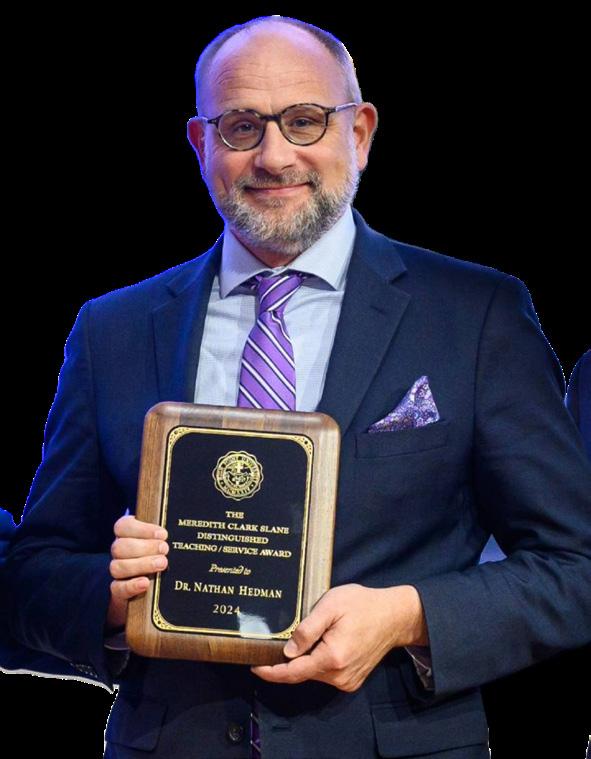
Dr. Hedman received the 2024 Meredith Clark Slane Distinguished Teaching-Service Award. Since joining HPU in 2014, Dr. Hedman has made a remarkable impact through his dedicated service, innovative teaching, and leadership of the Honors Scholar Program. Dr. Hedman played a significant role in developing and implementing the new Honors Scholars curriculum, which emphasizes project-based learning, collaborative teaching, and undergraduate research. Known for his interdisciplinary courses that blend theatre, English, and honors studies, he has received high praise from both colleagues and students.
Dr. Bryan Vescio, Professor and Chair of English
Dr. Vescio received the Extraordinary Leadership Award for his outstanding contributions to the university. Since joining HPU in 2015, Dr. Vescio has played a key role in strengthening the Department of English, enhancing student outcomes, and elevating the university’s academic reputation. He teaches a diverse range of courses on modern American literature and aesthetics and has contributed to important university committees, including the Phi Beta Kappa Steering Committee and serving as chair to the Academic Planning and Intercollegiate Review Committee.
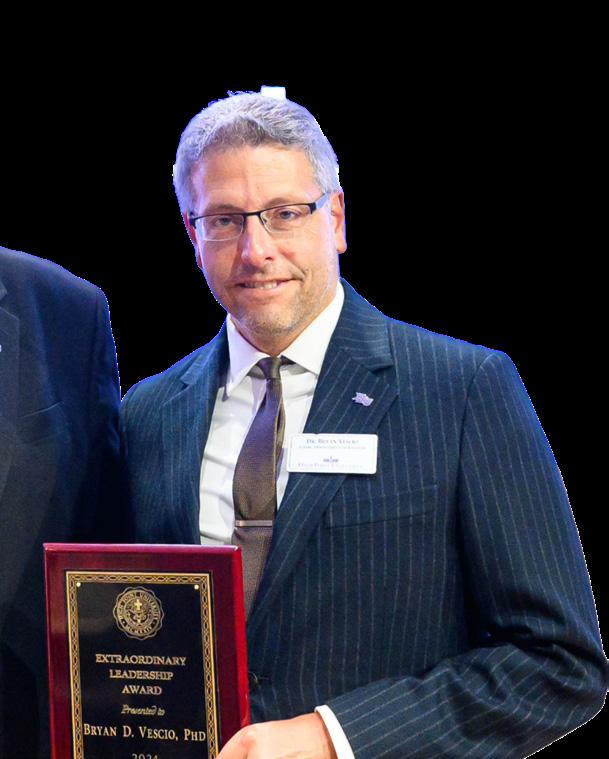
Douglas S. Witcher School of Humanities and Behavioral Sciences
Dr. Christopher Franks, Owen D. and Mattie Holt McPherson Associate Professor and Chair of the Department of Religion and Philosophy
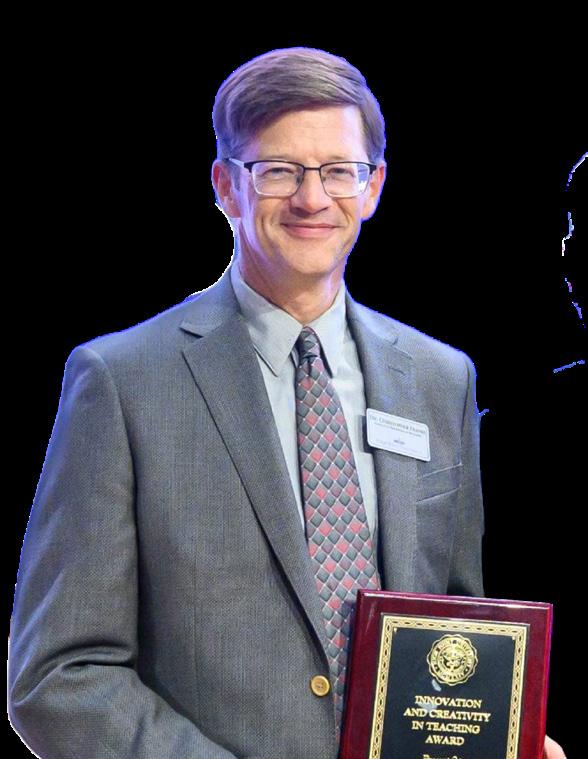
Dr. Franks received the 2024 Spirit of High Point University Award for his exemplary alignment with the university’s values. Since joining HPU in 2003, he has been a mentor and leader, fostering inclusivity and inspiring students’ engagement with Christian thought. As head of the FOCUS program for students pursuing ministry, his commitment extends beyond the classroom, where he frequently preaches at Chapel services and leads student pilgrimages, such as retracing the Apostle Paul’s journey in Greece. An ordained United Methodist minister, Franks is celebrated as a true servant-leader, embodying faith, moral virtue, and wisdom in all he does.
Dr. Rick Schneid, Herman and Louis Smith Professor of History
Last year, Dr. Frederick C. Schneid served as the Charles Boal Ewing Chair of Military History at the United States Military Academy at West Point. Before his one year term ended and he returned to HPU, he received the United States Army Public Service Commendation Medal for meritorious service and achievement while serving in the position at the Academy. As stated on the certificate awarded to him, “His outstanding teaching, contributions in scholarship, and development of faculty were essential to the success of the department’s mission.”
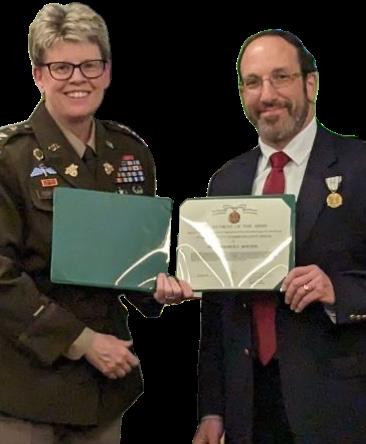
Dr. Paul Ringel, Professor of History
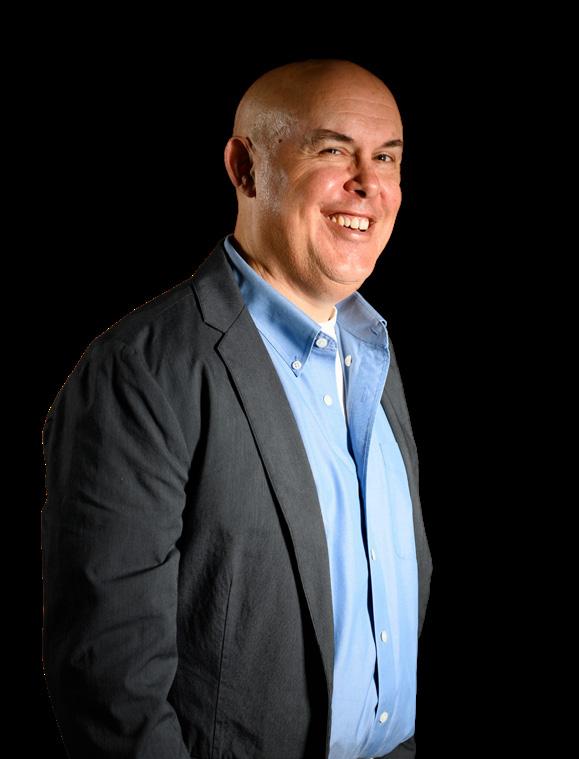
In November, Dr. Paul Ringel received the Reverend E.B. Freeman Award from the NAACP High Point Branch. The award recognizes advocates for the rights of others with outstanding contributions to the High Point community. For a decade, Dr. Ringel’s research has sought to tell the history of Black communities in High Point and advocate for the voices of Black citizens to receive attention within the city. He has also worked as a historical consultant on the One High Point Commission that sought to document racial disparities in the city, with a focus on the history of racial disparities in education. Additionally, he has made the stories of Black High Pointers available to the public through the William Penn Project Oral History Collection. Fall 2024 7
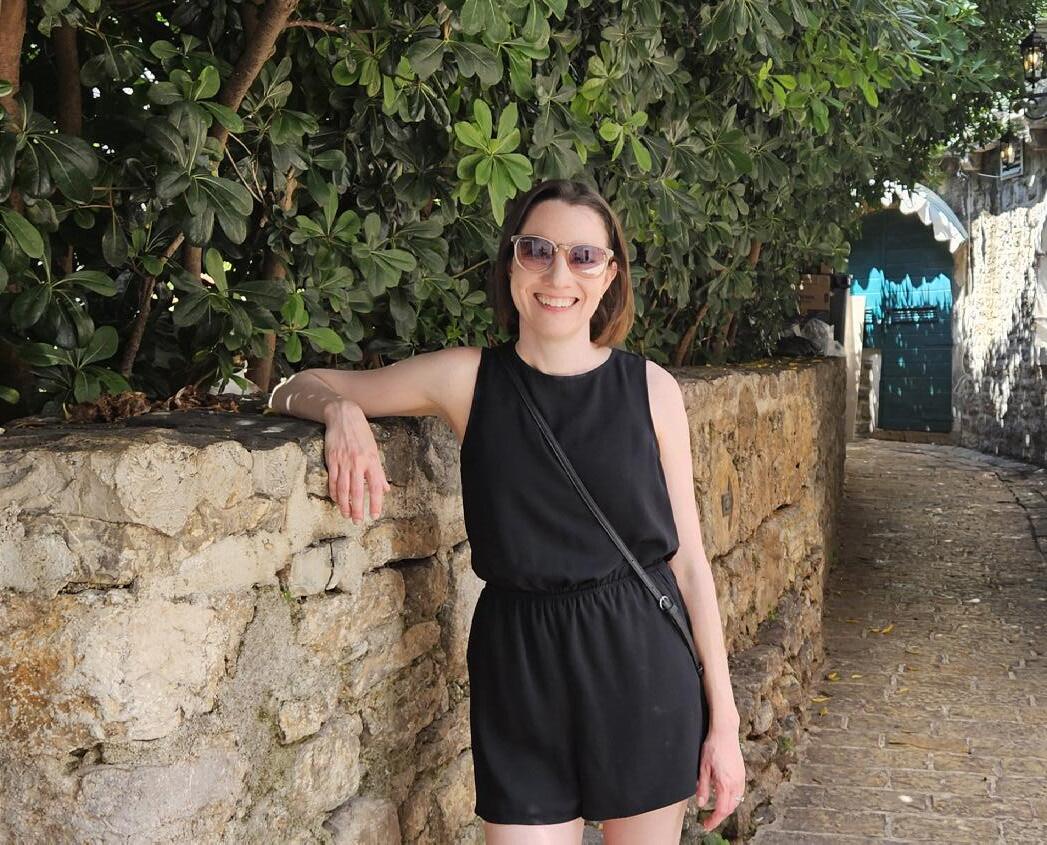
Dr.
Beth Hupfer,
associate professor of philosophy, investigates if AI will be the savior or the ruin of humanity.
In May of 2024, Dr. Beth Hupfer was accepted into a conference titled “Existential Threats and Other Disasters: How We Should address Them” in Budva, Montenegro hosted by the Hasting Center, The Center for the Study of Bioethics, and the Oxford Uerhiro Center for Practical Ethics. This conference brought together philosophers, computer scientists, public policy experts, bioethicists, environmental scientists, economists, and more, to discuss existential threats. Her presentation was titled AI: Longtermism’s Ruin or Savior.
Ever wonder why ChatGPT was invented? Why Elon Musk is so obsessed with rockets? Or why NASA and the US government have spent over 300 million dollars on a “planetary defense budget”? The answer to all of these questions is the philosophical theory known as Longtermism. Longtermism is the controversial theory that people should have moral concern for those who will live centuries from now. In this theory we are not talking about you or even your children, but potential people who have not even been born yet. If we take this concern seriously then we think that future people’s lives matter and that it is good to ensure the survival of humanity. This means focusing on “existential threats” that could end (or significantly harm) humanity such as nuclear war, climate change, Artificial Intelligence (AI), asteroid deflection, pandemics, and so on. Longtermism has grown in popularity from a philosophical theory to a social movement that impacts Silicon Valley, US politics, international laws, and more.
One issue in Longtermism is the debate about whether AI will save humanity from existential
threats or usher in the existential threat that actually ends humanity. On the one hand, many Longtermists think that responsible development of AI is the principle means by which we safeguard the existence of future people. If created sensibly, AI can predict and prevent existential threats and aid humans in ensuring the continuation of the human species as well as improving the quality of life for future generations. On the other hand, other Longtermists think that AI itself poses a profound risk to future people. In scary dystopian scenarios, we imagine AI turning on humans and killing us all! Maybe, but more likely threats are using AI as weapons in war, AI amassing too much economic power and replacing people in the economy, AI not valuing human life, and so on. To clarify the paradox of AI as either the savior or ruin of humanity, Hupfer examined the current situation at OpenAI (the creator of ChatGPT) to demonstrate how factions within Longtermism have implications in our lives.
“This was one of my favorite conferences I have presented at because it encapsulates what I try to teach students in my classes at HPU: philosophy and the moral theories we discuss have real world consequences,” Hupfer writes.

Just a week before Hurricane Helene swept through Western North Carolina, Dr. Timothy O’Keefe and Dr. Jacob Paul took part in the inaugural Punch Bucket Lit Festival in Asheville, NC, an event dedicated to fostering connections between Asheville’s writers and the broader literary community. Punch Bucket Lit champions diversity and inclusion in literature through outreach programs, monthly readings, and podcasts to create a platform for vibrant literary engagement.
Dr. O’Keefe, assistant professor of English and senior editor of Seneca Review, shared selections from his celebrated poetry collection, You Are the Phenomenology, winner of the 2017 Juniper Prize for Poetry. His works have appeared in numerous prestigious publications, including American Poetry Review and Best American Essays. Dr. Paul, associate professor of English, read from his most recent novel, Last Tower to Heaven. Paul’s storytelling also extends into the fine arts, with work featured in Hunger Mountain and Massachusetts Review. Together, O’Keefe and Paul represented High Point University’s commitment to literary excellence and creative exploration at this unique gathering.
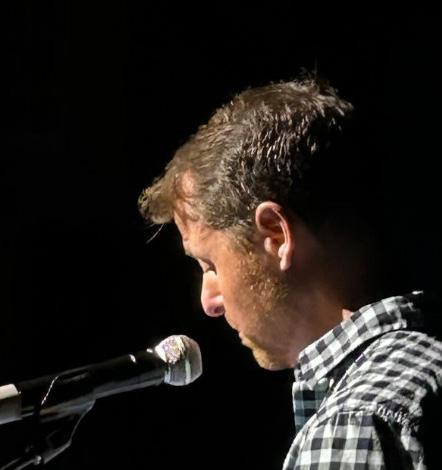
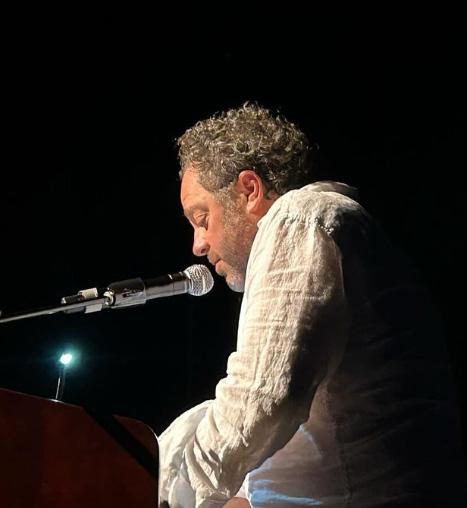

For the past two years, students in Dr. Kimberly Wear Jones’s psychology research lab have conducted research at the Roy B. Culler Senior Center.
Their research focuses on enhancing cognitive processes and examining the production effect in older adults. Specifically, one series of study aims to improve cognitive processes for older adults by using board games as an alternative to technology-based brain training tools. During this study, participants’ working memory and cognitive function were assessed before and after a 6-week program. Seniors who played games consistently showed significant improvement, highlighting board games as a cost-effective and enjoyable method to reduce cognitive decline.
Students also engage in community outreach by hosting educational events for center residents. Their initiatives include interactive memory workshops, technology assistance sessions, and seminars on brain health and memory strategies.
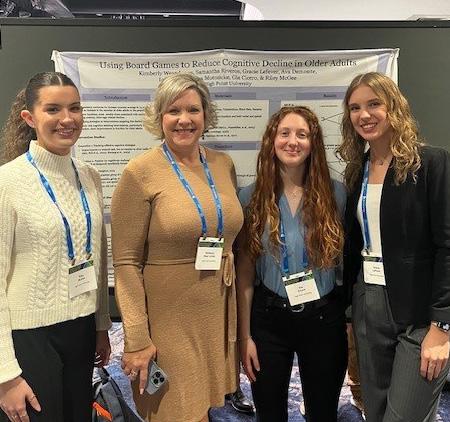
These professors are blending theory and practice to prepare students for life after college.
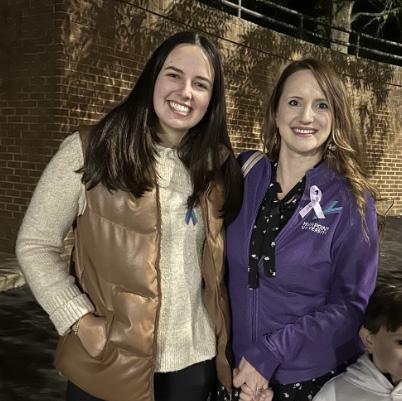
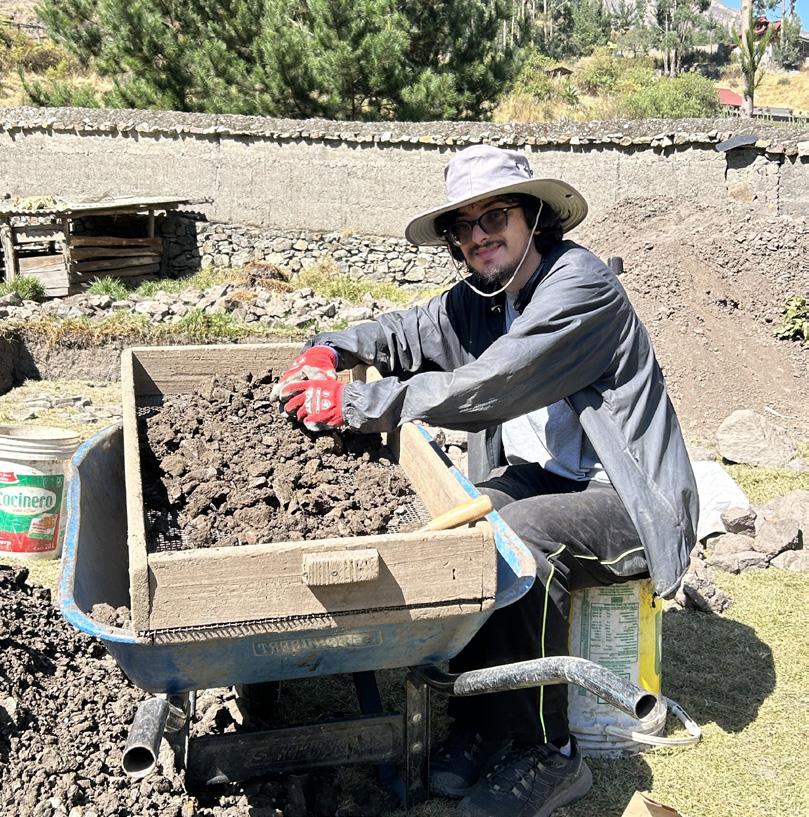

Dr. Kirsten Piatak, assistant professor of criminal justice, offered a hands-on, impactful approach to learning in her CRJ 1600: Victimology course. This service learning class partnered with the Guilford County Family Justice Center (FJC) to host the first annual Take Back the Night March on October 17th, which was a powerful event dedicated to standing in solidarity with victims and survivors of sexual violence. Additionally, five students from Dr. Piatak’s class attended the 6th annual NC Family Justice Center & Collaborative Communities Conference, where they joined national experts to explore strategies for supporting victims of violent crime such as elder abuse and strangulation.
Last summer, Drs. Matthew Sayre and Silvana Rosenfeld of the Sociology and Anthropology Department, took sociology and anthropology major Alex Molina to their archaeological project at Chavín de Huántar, Peru. Funded by NSF, Sayre and Rosenfeld are investigating the interconnections between ancient ritual and social differentiation at this important formative site (broadly 1500-200 B.C.). In the field, Alex mapped units and finds, and screened soil for small artifacts like bone beads and stone flakes. In the lab, he helped with the inventory of excavated materials, focusing on cataloging ceramic fragments and animal bones.
Dr. Adam Winkel, associate professor of Spanish and faculty sponsor for Sigma Delta Pi, the National Collegiate Hispanic Honor Society, led students in an annual tradition of honoring Día de los Muertos (Day of the Dead). Partnering with High Point Museum, students prepared ofrendas (altars) that were left on display for community visits. Preparing altars began as a tradition in Mexico to honor and remember deceased family and friends. HPU students have participated in the tradition for three years and decorated altars to honor their loved ones. Dr. Winkel also co-led a Maymester in the spring to Sevilla, Spain, with a special emphasis on the influence of soccer on Spanish society.
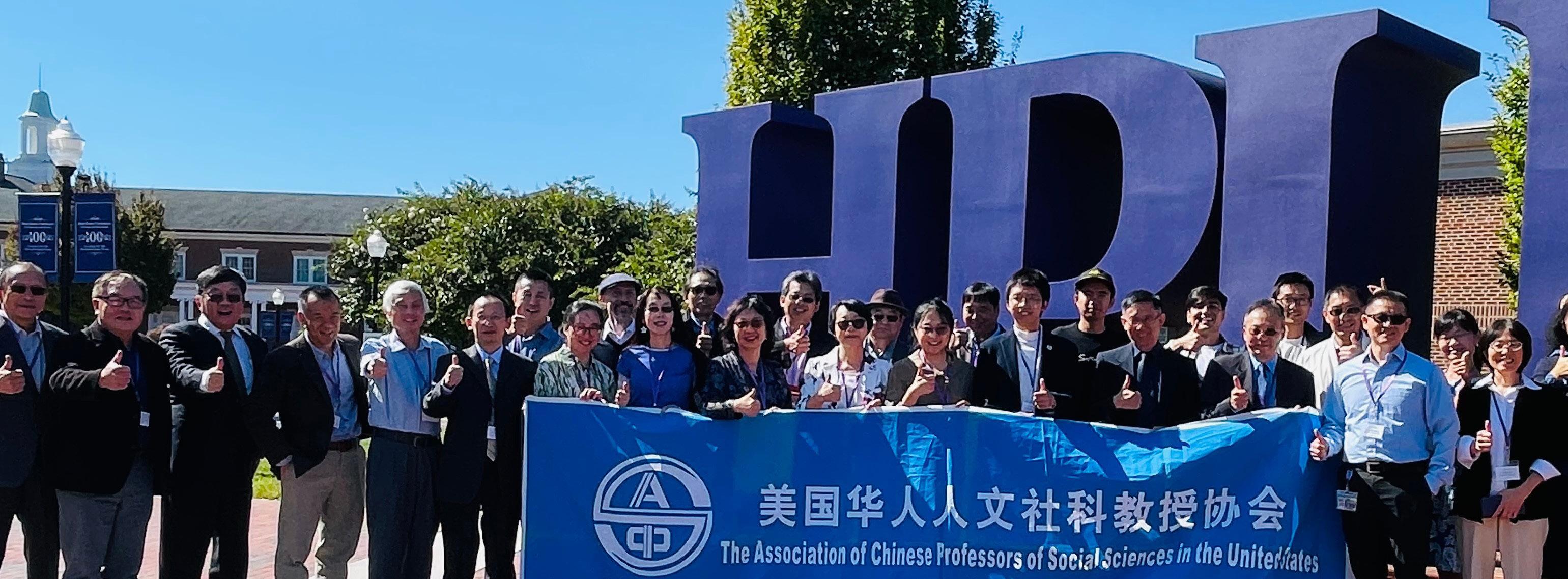
Dr. Daliang Wang, chair and associate professor of Chinese, was elected president of the Association of Chinese Professors of Social Sciences (ACPSS) at the 29th annual conference. On October 11-13, High Point University’s Department of World Languages, Literatures, and Cultures hosted the ACPSS’s international conference. The conference brought 36 in-person and 22 online participants from across the U.S., mainland China, and Taiwan to share interdisciplinary perspectives. All the participants were impressed by HPU’s beautiful campus, strong student enrollment, and recent developments. Dr. Wang will serve a two-year term as president of the organization.

Ken Elston, Dean and co-leader of the World Higher Education Network, a part of the Wellbeing Project, helped organize the annual conference. In July, members gathered at Tecnológico de Monterrey in Queretaro, Mexico. Interpreting outcomes from the 2023 Switzerland gathering, Elston shaped the agenda on ecological belonging and led workshops on wellbeing in higher education. Using Joseph Campbell’s Hero’s Journey, attendees created organizational wellbeing stories and silent movies, while also outlining actionable steps for the year ahead. As co-chair of the networks’ Arts Initiative, Elston incorporated concepts of multiple ways of knowing and designed a series of dynamic, artistic engagements to anchor the agenda.
Opposite page: Top, Jillian Wells, class of 2023 graduate, and Dr. Piatak support the first annual Take Back the Night March; middle, Alex Molina screens soil in Chavín de Huantar, Peru; bottom, Dr. Winkel, center, works with students at the High Point Museum to create altars for Día de los Muertos. This page: Top, Dr. Wang, far right, with participants of this year’s ACPSS conference; bottom, Dean Elston, second to right, at the second annual Wellbeing of the World conference.
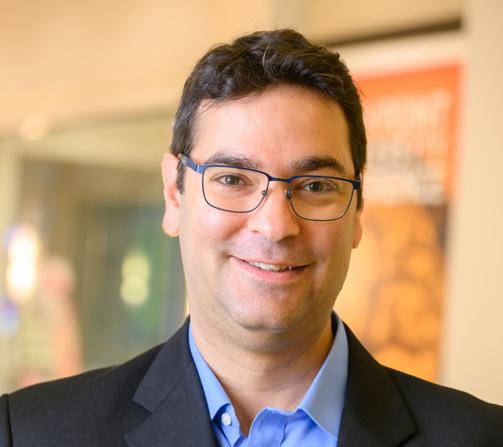
Dr. Daniel Armenti
Assistant Professor of Italian Studies
Rabbi Dr. Andrew Ettin
Visiting Assistant Professor of Religion
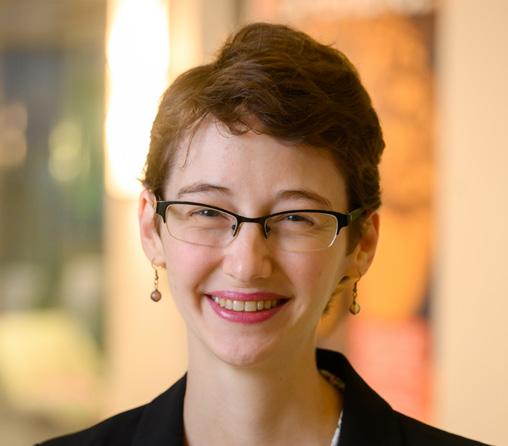
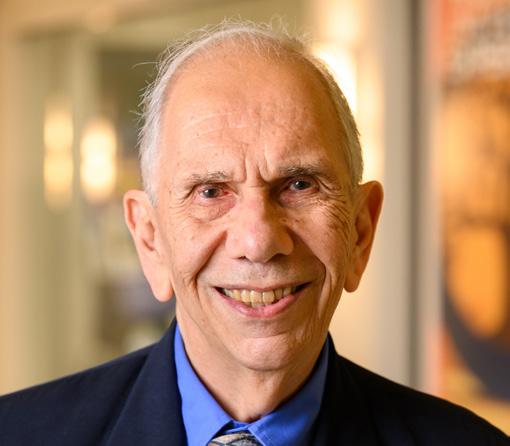
Dr. Megan Fenrich
Visiting Assistant Professor of Italian Studies
Dr. Sheldon Gosline
Visiting Assistant Professor of Medical Anthropology
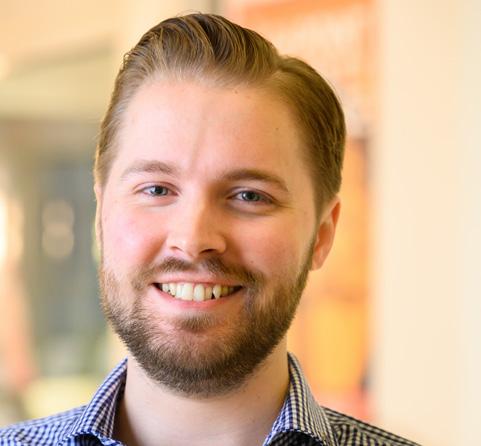

Dr. Keaton Kirkpatrick
Assistant Professor of English and Director of First-Year Writing
Dr. Melissa Schoenlein
Assistant Professor of Psychology
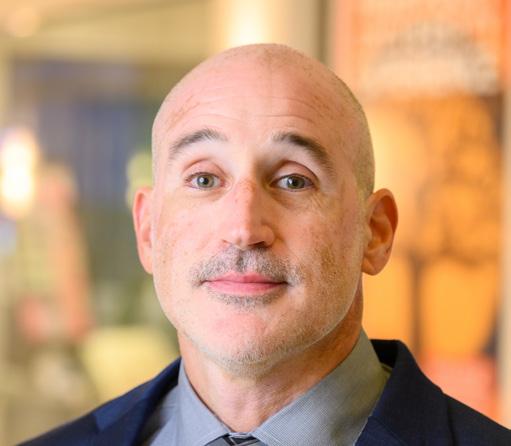

Mr. Shannon O’Toole Instructor of Criminal Justice
Dr. Alec Szalewski, interim chair and assistant professor, co-authored “Factors Associated With Legal Decisions of Nonfatal Strangulation Cases With Forensic Evidence” in Criminal Justice Policy Review, Vol. 35, Issue 5-6 (2024).
Dr. Kirsten Piatak, assistant professor, published “LGBTQ+ identity and delinquency: The importance of negative emotions and social bonds” in Criminal Justice Studies, Vol. 37, Issue 3 (2024) and “Bullying-related victimization and delinquency: mediation by negative emotions and moderation by LGBTQ+ identity” in Journal of Crime and Justice (2024).
Dr. Laura Alexander, associate professor, published an essay on Eighteenth-Century Fiction called “Nathaniel Lee and the Lucretian Sublime,” in Eighteenth-Century Fiction 36, no. 4 (October 2024).
Dr. Charmaine Cadeau, became coeditor of a nationally distributed poetry journal, Tar River.
Ms. Jessica Higgins, instructor, presented the poster “Gamifying Team-Based Learning: How to Use Team Competition to Boost Student Engagement and Enhance Analytical Writing,” at the Scholarship of Teaching and Learning (SoTL) Commons Conference at Georgia Southern University, in Savannah, GA on February 28, 2024.
Ms. Allison Walker, Director of Service Learning and instructor of English, presented “Service WITH, not FOR: Transformative Service at the
Intersection of Self-Compassion and Ethical Reasoning” at the International Association for Research on Service Learning and Community Engagement (IARSLCE) hosted by the University of California San Diego on October 3rd.
Dr. Amanda Allen, assistant professor, presented on a roundtable titled “Navigating the Changing Landscape of Academia: Tips and Resources for Non-Traditional Academic Positions” at the Southern Conference on British Studies in Kansas City. Here she focused on using grants and community partners to create and fund on-going collaborative projects in academia.
Dr. Paul Ringel, professor, presented “Teaching Local History Through Community Engagement” at the National Collegiate Honors Council national meeting in Kansas City in October. He also published a chapter in the Edinburgh History of Children’s Periodicals, entitled “The Brownies Book and the American Children’s Publishing Industry.”
Dr. Gordon Ballingrud, assistant professor, along with student Gia Scirrotto, published “Obscenity, Hate Speech, and Viewpoint Discrimination: A Formula for Hate Speech as an Unprotected Category,” in Dartmouth Law Journal 20, no. 1 (2022).
Dr. Stacy Lipowski, associate dean and associate professor, along
with student Hannah Tameling Dobbs, published “Production and Preschoolers: Is There a Benefit and Do They Know?” in Experimental Psychology (2024).
Dr. Robert Moses, associate professor, presented, “Gentile Women and Jewish Mary in Matthew’s Genealogy: Implications for Matthew’s Gospel” in Melbourne, Australia at the Society of New Testament Studies Conference, July 25, 2024.
Dr. Silvana Rosenfeld, associate professor, presented “Moving across the Wari city of Conchopata, AD 600-100, Peru” at the Theoretical Archaeological Group Conference in Santa Fe, NM. Additionally, she and Dr. Matthew Sayre presented, “Searching for the Domestic at Chavín. Integrating 20+ years of archaeology in La Banda,” and “Daily Life Outside the Monument: Recent Excavations at the La Banda Sector, Chavín de Huántar,” at the Society for American Archaeology Meeting in New Orleans, LA.
Dr. Denis Dépinoy, assistant professor of French, published a study of graphic novels and comic books, titled “Il y a un lutin dans le Bois aux Roches!: Formes et sens du merveilleux dans la série Johan et Pirlouit de Peyo.” Neophilologus
108.2, June 2024, pp. 181-196. He also presented “De la constitution à la restitution du sensible dans La Guerre d’Alan d’Emmanuel Guibert” at the Northeast Modern Language Association Convention in Boston on March 8, 2024.
Dr. Daniel Armenti, assistant professor of Italian Studies, published an entry on Giovanni Boccaccio’s De Mulieribus Claris this past year. He also serves as associate editor with the Palgrave Encyclopedia of Women’s Writing in the Global Middle Ages (500-1525 CE).
Dr. Adam Winkel, associate professor of Spanish, published “The Crown in the Crowd: Sport and the House of Bourbon, 1975-2021.” in Bulletin of Spanish Studies, Vol. 101, no. 5-6, (2024). He also published a book chapter: “Together, Alone, and in the Same Place: The Cinematic Living Room in the 1950s,” in Comfort and Domestic Space in Modern Spain, edited by Susan Larson. University of Toronto Press, (2024). Additionally, he presented at two conferences: “Literary Sketches of the Football Crowd in Franco’s Spain” at the Chorus of the Crowd: Culture, Power, and Identities in Football Fandom in Lisbon, Portugal. And later at the International Football History Conference, in Cardiff, Wales he presented “Spanish Spaces of Fandom: The Football Stadiums of the Franco Regime.”
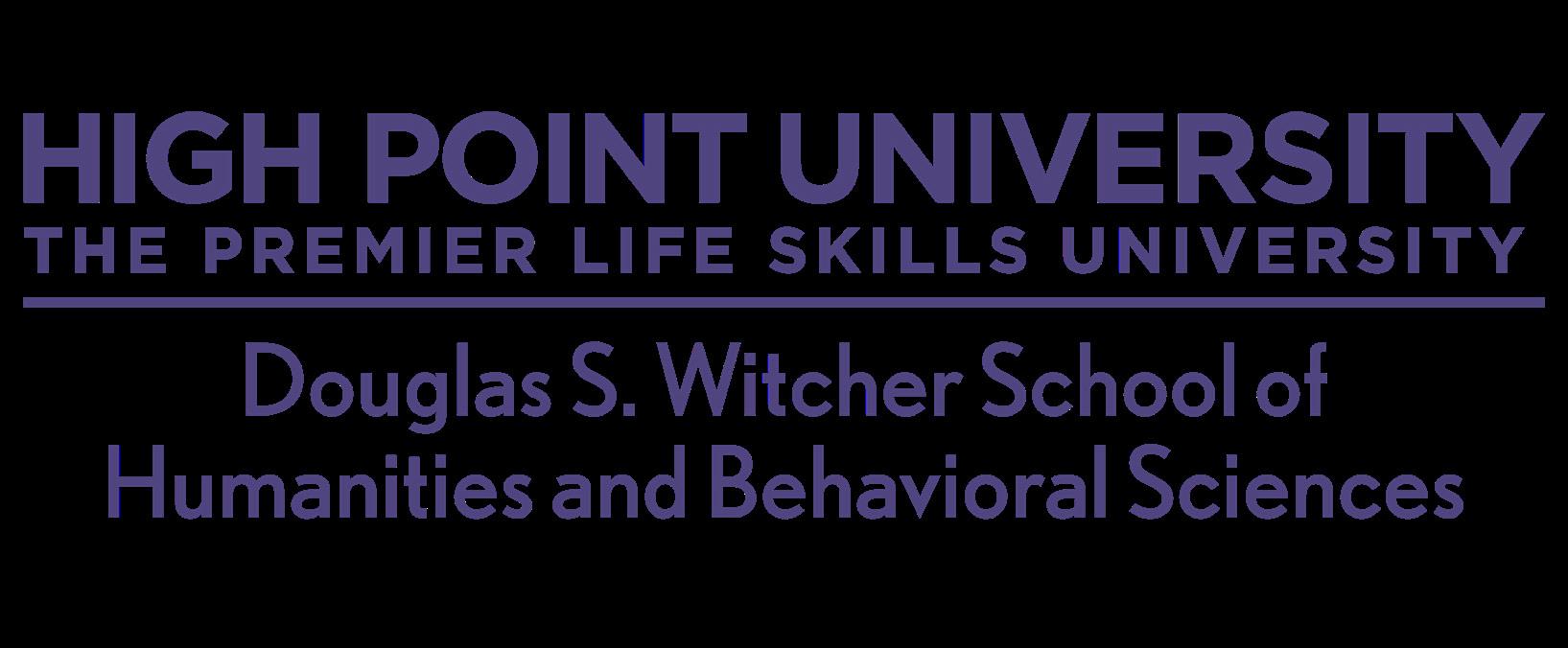

The Behavioral and Social Sciences Talented (BESST) Fellows program proudly welcomes its inaugural cohort of 21 freshman. Open to majors in Criminal Justice, Political Science, Psychology, and Sociology & Anthropology, these students will deepen their college experience through collaborative and interdisciplinary research opportunities in the social sciences.
Our program’s mission is to empower and enlighten students with the knowledge and skills needed to thrive both now and in the future. Under the leadership of Dr. Mark Plume, assisted by Dr. Kirsten Piatak, and partnering with dedicated faculty, BESST Fellows engage in research, explore professional topics, and gain a nuanced understanding of human behavior and interpersonal dynamics. Through this interdisciplinary, hands-on approach, BESST Fellows will enhance their academic journey and expand their post-graduate opportunities.
Think. Feel. Act.
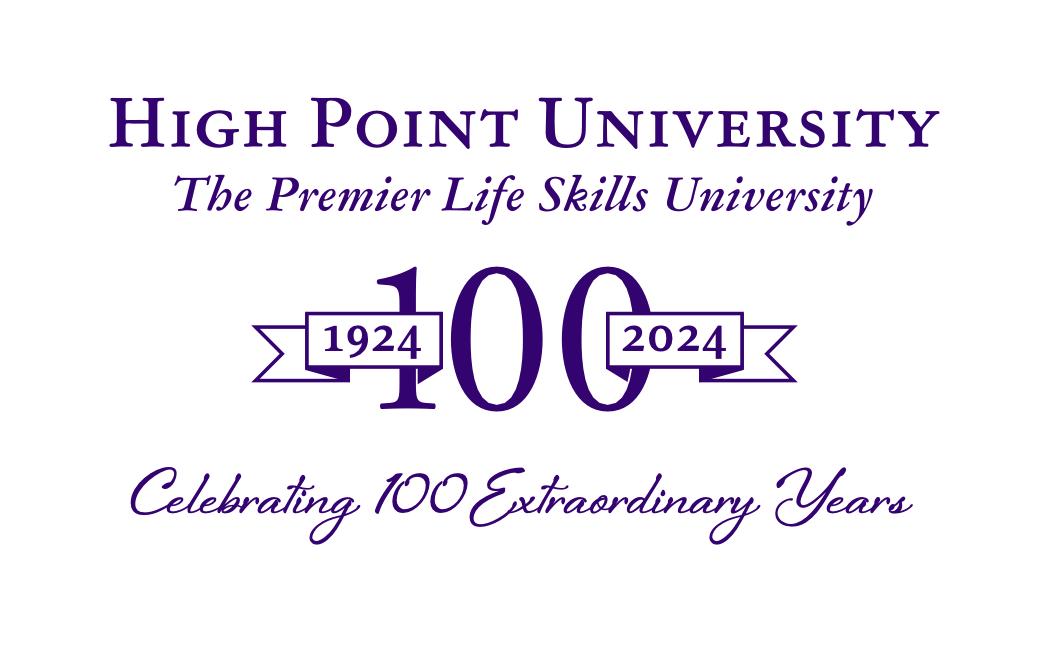
highpoint.edu/humanities-behavioral-sciences/
